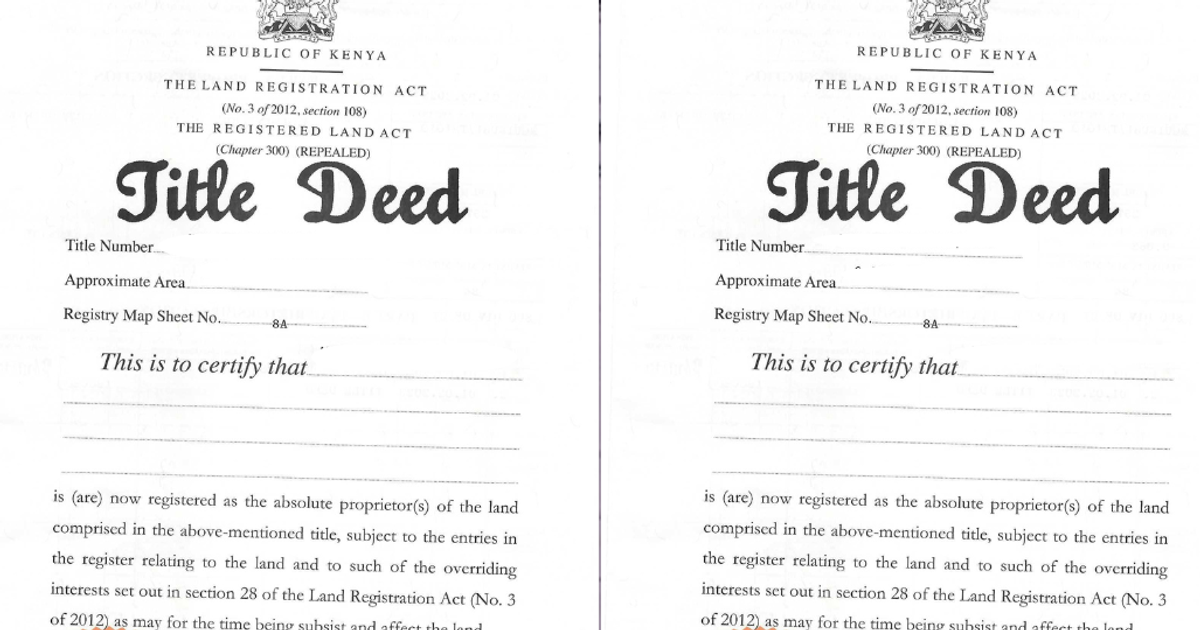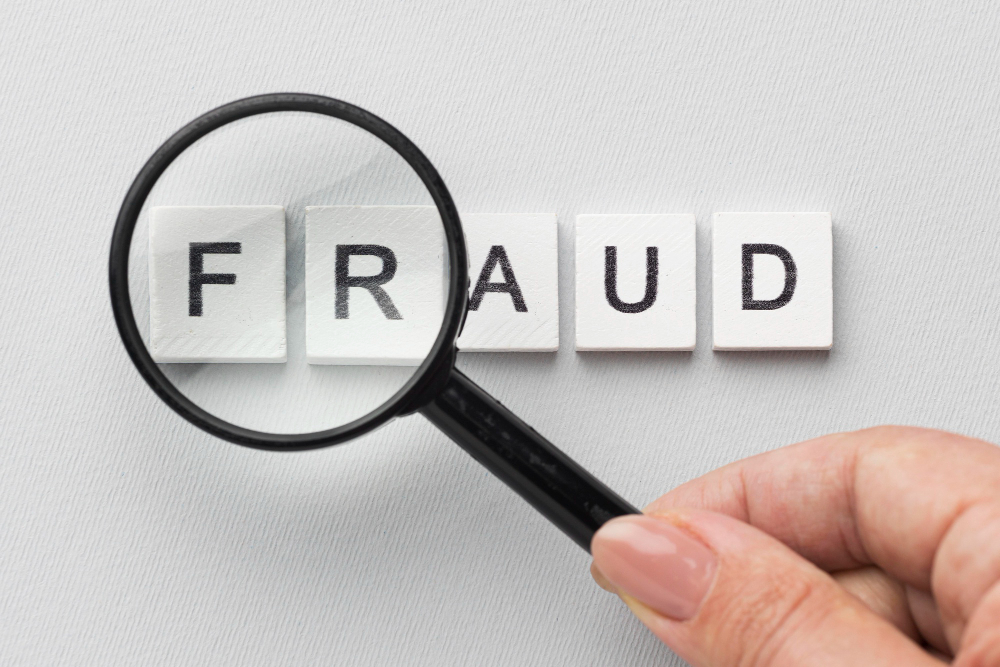Understanding legal aspects of Property Titles in Kenya
A genuine title deed is legally recognized under the Land Act in the Kenyan constitution. Since independence in 1963, Kenya's land has been divided and redistributed in various ways, reflecting the country’s complex history of land ownership and usage.
The Land Act has changed over the years to make buying land equitable and smoother for most property owners and investors. The government's reason for these changes and improvements is to encourage international investors and developers to participate in the real estate sector.
In this article, we will discuss the evolution of land laws and highlight the projects initiated by the government—both past and ongoing—to gain a good understanding of the legal framework.

The Land Registration Act in Kenya, which shapes the country's land reforms, has evolved significantly over the past years. Socioeconomic changes and the need for efficiency in land management have contributed to this evolution of repealed land laws.
The changes date back to the colonial era when Kenya's land was under the colonialists. In 1902, the government controlled the land under the Crown Lands Ordinance.
The Crown Lands Ordinance of 1902 was a significant piece of legislation during the colonial era in Kenya. It established a land ownership and management framework.

The British colonial government established the ordinance to assert the land resources and facilitate agricultural development, particularly for the settlers entering the country.
The British monarchy ultimately owned the Crown Land Ordinance and categorized it into different classes, including the Crown Land, which was available for lease by the settlers. European colonists were given large tracts of land mainly for farming and other agricultural purposes.
The system marginalized the local communities and led to the displacement of many Kenyan indigenous communities, leading to significant social and economic inequalities.
Various land reform initiatives were made after independence, but the Crown Land Ordinance still influenced them. After Kenya's independence in 1963, the government took over from the colonialists. It redistributed the land to Kenyan citizens, establishing land laws that brought historical justice to the country and its people.
Following independence, the Registered Land Act of 1963 implemented a systematic approach to land registration. The land laws aimed to make real estate transactions easier for the community and its citizens by guaranteeing their tenure.

The Land Law changes: In the latter half of the 20th century, the government launched several changes to address inefficiencies and corruption in land administration. The National Land Commission was established in 2012 as part of the reforms to supervise land administration.
The Land Registration Act of 2012 established a contemporary framework for land registration and harmonized earlier land legislation. The act aimed for an easy-to-follow process for land transfers and registration. This strengthened property ownership, such as safeguarding the titles.
The Title Deed Conversion Process in Kenya is the transition through which the existing title deeds under previous land laws are updated to the current legal framework according to the Land Registration Act 2012
Landowners must submit the formal application to the land registry, including the original title deed and relevant requirements required by the Land Registration Act.
The next step is partaken by the land registry. The land registry is legally obligated to verify the authenticity of the submitted documents. Verification includes checking for encumbrances, disputes, or legal issues associated with the title deed.
A land survey has to be mandated by law to confirm the property boundaries and zoning regulations. This step is crucial for establishing legal ownership and preventing future disputes regarding land boundaries.
After the verification process and land survey, the land registry will issue a new title deed. This document is legally the official proof of ownership under the new land laws.
The new title deed must be registered in the lands registry to be legally recognized. This registration is essential for establishing the owner's legal rights and ensuring compliance with the Land Registration Act.
A new title deed may be issued in a government gazette as part of the legal requirements. The information gazette informs stakeholders about public changes in land ownership.
This title is issued for land registered under the Registered Land Act (repealed) and now under the Land Registration Act, 2012. It represents full ownership, giving the holder exclusive rights to the land.
The Rights include Full, indefeasible ownership, including the right to sell, lease, transfer, or develop the land.
Leasehold title deeds are issued for land owned by an entity (usually the government or local authorities) but leased to individuals or companies for a specific period, usually 99 years.
The leaseholder has rights to use and develop the land, but the land ultimately reverts to the government or original owner after the lease period. The lease can be renewed upon expiration.
Most urban properties like Nairobi are held under leasehold titles because the government or county authorities own the land.
This type of title deed grants the owner perpetual ownership of the land. It is common in rural areas and agricultural land. The owner has complete control over the land and can pass it down to future generations without time limits or restrictions.
Full ownership without an expiry period, giving the owner the right to sell, lease, or transfer the land freely.
While both Freehold and Absolute titles represent full ownership, Freehold is more commonly associated with traditional land systems and may have been converted from customary land tenure.
This is issued for ownership of a unit within a larger property, such as an apartment or a condominium. It is based on the Sectional Properties Act of 2020, which allows individual ownership of building sections while the land remains co-owned.
The holder has rights to their specific unit (e.g., apartment) and shared ownership of common areas such as hallways, parking, or gardens. This is common in developments like gated communities and apartment blocks.
This title recognizes land ownership based on traditional or customary laws, particularly for communities in rural areas. Although customary land is often communally owned, individuals may have rights to specific portions of land through inheritance or communal agreements.
The rights of the holder are recognized based on the customs and traditions of the community, and the land can be passed down or allocated within the community.
Under Kenya's Community Land Act of 2016, customary land can be converted into individual ownership with an Absolute or Freehold title.
This is the legal document issued to leaseholders for a defined period. It outlines the lease terms, such as the period, conditions of use, and the obligations of the lessor (owner) and lessee (tenant).
The lessee has the right to use and develop the land for the duration of the lease, but ownership remains with the lessor. Leaseholders can transfer or sublease their interest.
This is a short-term license granted by the government for the temporary use of public land. It is commonly used for land earmarked for future developments or projects.
The licensee has the right to occupy and use the land for a limited period, usually up to one year, but it can be renewed. The license does not grant ownership.
This applies mainly to land owned by companies or cooperatives, where members or shareholders are issued a certificate representing their share of the land. Each member owns a portion of the land through the cooperative or company.
The holder of the share certificate has the right to use and benefit from a portion of the land but does not own it individually. The company or cooperative owns the land.
These titles are held by government agencies or the National Land Commission (NLC) for land that belongs to the public. Examples include national parks, forests, and road reserves.
The government holds and manages this land in trust for the public; it cannot be privately owned. Public land can only be used for public purposes like infrastructure development or conservation.

A fraudulent title deed is a fake document used in land scams, leading to land disputes, property loss, and legal complications. Property buyers and owners need to know the signs of these frauds to protect themselves from scams. Below are steps to identify fraudulent title deeds in Kenya:
The land registry searches for property owners to ensure the title deed is free of encumbrances, such as mortgages or disputes. It recognizes if the title deed matches its information.
Many fraudulent title deeds contain fake seals, signatures, or altered information. The official government seal and watermark validate the title deed.

Signatures Cross-check the signatures of authorized officers with records from the Ministry. Any inconsistency, especially in formatting or details, could indicate forgery.
Fraudsters often create fake title deeds by claiming ownership of land that belongs to other people or is government land.
Tracing the title's history and previous owners through the Ministry of Lands is essential. This can help verify that the ownership transfer process was legal and properly documented.
A legitimate title deed will have a clear and uninterrupted ownership history.
A licensed surveyor can verify whether the land described in the title deed matches the actual plot on the ground.

Fraudulent title deeds may describe land that either does not exist or is different from what is being sold. A surveyor will also check the official map (cadastral map) and confirm if the plot boundaries match the deed's description.
Some fraudulent title deeds are created through multiple registrations of the same land. This can happen when The exact plot of land is registered to more than one person.
Different title deeds are issued for the same property by fraudulently manipulating the land records. Search for the Ministry of Lands to ensure no duplicate titles for the land.
Encumbrances on land include mortgages, court orders, and disputes. Fraudsters sell land that is under dispute or already mortgaged. You have to look for any signs to protect yourself from land that is not legally transferrable and will cause future problems.
Involving an experienced real estate lawyer with experience in land transactions can assist in verifying the authenticity of a title deed. They will have to check legal procedures and the ownership chain. Lawyers can also detect irregularities in the transaction process that might indicate fraud.
The National Land Commission (NLC) handles public land, community land, and land fraud issues. If there are doubts about the ownership of land, especially government or public land, the NLC can clarify whether the land is legally owned or involved in any disputes.
A property buyer should be used in too-good-to-be-true offers where the land is sold below the market value. Property buyers must be cautious of sellers who rush sales and pressure them to make quick decisions. Sellers reluctant to provide all necessary documents for verification are also red flags to watch out for.
Engaging a licensed real estate agent who is well-versed in the local real estate market can assist you with verifying the legitimacy of both the land and the title deed and ensuring proper procedures are followed during the transaction. The Real Estate Agents Registration Board (EARB) must register the agent.
Ensure the title deed numbers are genuine and correctly formatted according to Kenyan land registration standards. Most Fraudsters use incorrect numbers that do not correspond to valid land records. To prevent this, do your due diligence on the title search.
The Legal Action to take for fraudulent title deeds is reporting the matter to the Ministry of Lands, the National Land Commission, or law enforcement authorities. Opening a court case to challenge and nullify fraudulent titles is possible, and The court may restore legitimate ownership.
A genuine title deed proves land ownership and gives the holder legal rights over the property. Title deeds in Kenya are classified under two main categories: freehold title and leasehold ownership. Freehold title grants the owner indefinite ownership, while leasehold ownership limits ownership to a specific period, typically 99 years.
To ensure legitimate land ownership, the Ministry of Lands conducts a title deed search. This process verifies the authenticity of the land title deed and confirms the absence of fraudulent title deeds. Genuine title deeds must include details such as the owner's name, land size, and the date the title deed was created, all governed by repealed land registration statutes and updated under current laws.
The title deed conversion process comes into play when existing titles are converted to comply with updated laws following the repealed land laws. This process ensures that each parcel of land has only one title deed that is valid under the current legal framework. An absolute title deed grants complete ownership without conditions, which is particularly important for agricultural land and other critical uses.
Land ownership in Kenya is also secured through repealed land registration statutes, ensuring older property titles are respected and transitioned smoothly. The Land Registration Act has replaced these repealed land laws, providing a clearer framework for managing title deeds. To sum it up, the legal aspects of property titles in Kenya are vital for securing property ownership and ensuring transparency in land transactions. With these laws, you are assured of protection when it comes to property ownership. Invest with us today.
A genuine title deed in Kenya includes a unique title number, registered owner’s name, land description, land size, official stamp from the Ministry of Lands, signatures of the land registrar, and the date of issuance.
The law on land ownership in Kenya is primarily governed by the Constitution of Kenya (2010), the Land Act (2012), the Land Registration Act (2012), and the National Land Commission Act (2012), which regulate land acquisition, use, and transfer.
Proof of property ownership in Kenya is typically demonstrated through a title deed or a certificate of lease.
Yes, a title deed in Kenya can have two or more names, allowing joint property ownership.
Admin. (2023, September 8). Section 23 of the registration of titles act – did it really protect the bona fide purchaser?. Oraro & Company Advocates. https://www.oraro.co.ke/section-23-of-the-registration-of-titles-act-did-it-really-protect-the-bona-fide-purchaser/
Advantages of having a registered title: National Land Agency: One agency, one goal. Advantages of Having a Registered Title | National Land Agency | One Agency, One Goal. (n.d.). https://www.nla.gov.jm/content/advantages-having-registered-title
The Essential Guide to Real Estate Due Diligence in Kenya - CR Advocates LLP. CR Advocates LLP -. (2024, June 3). https://www.cradvocatesllp.com/the-essential-guide-to-real-estate-due-diligence-in-kenya/
Home. Title Deed: Importance, Types & Advantages | UltraTech Cement. (n.d.). https://www.ultratechcement.com/for-homebuilders/home-building-explained-single/planning/what-is-a-title-deed
Land registration act 3 of 2012 - national land commission. (n.d.). https://landcommission.go.ke/download/land-registration-act-3-of-2012/
Wanyoike, P. (n.d.). The role of the registry index map (RIM) in ... https://fig.net/resources/proceedings/2001/nairobi/wanyoike-TS19-2.pdf